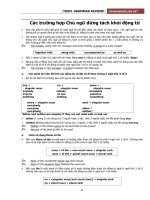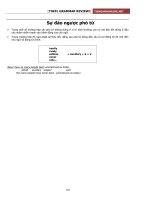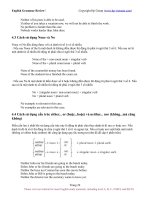GRAMMAR REVIEW
Bạn đang xem bản rút gọn của tài liệu. Xem và tải ngay bản đầy đủ của tài liệu tại đây (7.42 MB, 63 trang )
GRAMMAR REVIEW
I. ADVERBS OF FREQUENCY = ADVERBS OF TIME
I. ADVERBS OF DEFINITE FREQUENCY:
+ hourly, daily, weekly, monthly, yearly
+ every second, once a minute, twice a year
+ once, twice, once or twice, three times
1. AT THE END OF A SENTENCE:
• Most companies pay taxes yearly.
• The manager checks the toilets every hour.
• The directors meet weekly to review progress.
2. AT THE FRONT OF A SENTENCE FOR REASONS OF EMPHASIS:
• Every day, more than five thousand people die on our roads.
II. ADVERBS OF
INDEFINITE FREQUENCY
0%
NEVER
SELDOM
RARELY
30%
OCCASIONALLY
SOMETIMES
50%
OFTEN
NORMALLY
USUALLY
ALWAYS
100%
1. BEFORE NORMAL VERBS:
• We usually go shopping on Saturday.
• I have often done that.
2. AFTER THE VERB ‘BE’:
• She is always late.
3. AT THE BEGINNING OR END OF A SENTENCE :
Occasionally, sometimes, often , generally, frequently, usually
• Sometimes they come and stay with us.
• I play tennis occasionally.
CONJUNCTIONS
Coordinating Conjunctions Subordinating Conjunctions
and, but, or, nor, for, yet, so,
either … or
neither nor
although, because, since, unless,
as, when, while, so … that, such
….that; in order that, whereas…
•Coordinating conjunctions: used to join two parts of a sentence
that are grammatically equal (independent clauses).
- Jack and Jill went up the hill.
- The water was warm, but I didn't go swimming.
• Subordinating conjunctions: used to join a subordinate dependent
clause to main clause.
- I went swimming although it was very cold.
PREPOSITIONS OF TIME
ENGLISH
USAGE
ON
DAYS OF WEEK
DATE
IN
MONTH / SEASON
TIME OF DAYS
YEAR / CENTURY
CERTAIN TIME IN FUTURE
EXAMPLE
ON MONDAY
ON 9th APRIL
IN AUGUST
IN THE MORNING
IN 2011 / IN THE 21ST CENTURY
IN THREE DAYS’ TIME
AT
FOR NIGHT / NOON
FOR WEEKEND
FOR A CERTAIN POINT OF TIME
AT NOON/ AT NIGHT
AT THE WEEKEND / AT
WEKENDS
AT 10 O’CLOCK
SINCE
FROM A CERTAIN POINT OF TIME
SINCE 1980
FOR
OVER A CERTAIN PERIOD OF TIME
FOR 10 YEARS
AGO
A CERTAIN TIME IN THE PAST
5 YEARS AGO
BEFORE
EARLIER THAN A CERTAIN POINT OF TIME
TILL / UNTIL
IN THE SENSE OF HOW LONG IT LASTS
BY
IN THE SENSE OF AT THE LASTEST
BEFORE NOON
BEFORE 2015
TILL / UNTIL NEXT SATURDAY
BY 9 O’CLOCK
PREPOSITIONS OF PLACE
ENGLISH
IN
AT
ON
BY , NEXT
TO, BESIDE
USAGE
EXAMPLE
• room, building, street, town, city, country
• book, paper, bag, box etc.
• car, taxi
•picture, world
in the kitchen, in London,
in Vietnam
in the book
in the car, in a taxi
in the picture, in the world
• meaning next to, by an object
• for table
• for events
• place where you are to do something
at the door, at the station
at the table
at a concert, at the party
at the cinema, at school, at
work
• attached
• for a place with a river
• being on a surface
• for a certain side (left, right)
• for a floor in a house
• for public transport
• for television, radio
the picture on the wall
London lies on the Thames.
on the table
on the left
on the first floor
on the bus, on a plane
on TV, on the radio
on the left or right of somebody or something Jane is standing by / next to /
beside the car.
ENGLISH
USAGE
UNDER
on the ground, lower than something else
The bag is under the table
• covered by something else
• meaning more than
• getting to the other side (also across)
• overcoming an obstacle
• Put a jacket over your shirt
• Over 16 years of age
• Walk over the bridge
• Climb over the wall
getting to the other side
Walk across the bridge
Swim across the lake
OVER
ACROSS
THROUGH
TO
FROM
TOWARDS
EXAMPLE
something with limits on top, bottom and
the sides
Drive through the tunnel
movement to person or building
movement to a place or country
go to the cinema
go to London / Ireland
in the sense of where from
a flower from the garden
movement in the direction of something
go 5 steps towards the house
TRANSITION WORDS
Transition words are used to join two independent clauses
INDEPENDENT CLAUSE 1
; /.
The demand has increased sharply
TRASITION WORD
,
; accordingly ,
INDEPENDENT CLAUSE 2
the prices are higher now.
Types of transition words
1. Contrasting ideas : on the other hand, in contrast, however,
nonetheless, nevertheless, even so, still.
• She studied diligently for several months; nevertheless , she failed.
• George is very handsome; however, he is not popular with girls.
• It's raining. Even so, we must go out.
2. Result: therefore, thus, hence, accordingly, consequently, as a
result, as a consequence, for this/that reason.
• He passed his exams; therefore, he had some good news to tell his
parents.
• He lacks self-confidence. As a consequence, he is unlikely to be
successful.
3. Additional ideas: furthermore, besides, in addition, moreover,
also.
• Alex plays football. Moreover, he runs a restaurant.
• Maria writes short stories; in addition, she writes articles for a
newspaper.
4. Negative condition: otherwise
• You must study hard. Otherwise, you may fail.
Causative form
The causative verbs "let," "make," "have," and "get.“
S + HAVE /GET SOMETHING + PP
I had /got my hair cut.
S + HAVE + SOMEONE + BARE INFINITIVE
They had their mother pick them at school.
S + GET + SOMEONE + TO INFINITIVE
HE’LL GET THEM TO ARRIVE BEFORE 10 O’CLOCK
LET / MAKE + SOMEONE + BARE INFINITIVE
MY MOTHER MADE THEIR KIDS DO HOMEWORK
Conditionals
I. PRESENT REAL CONDITION (TYPE 0)
IF – CLAUSE,
SIMPLE PRESENT
MAIN CLAUSE
SIMPLE PRESENT
IF YOU EAT TOO MUCH , YOU GET FAT
IF A COMPANY PAYS WELL, IT ATTRACTS GOOD WORKERS
II. FUTURE POSSIBLE CONDITION (TYPE 1)
IF CLAUSE,
SIMPLE PRESENT,
MAIN CLAUSE
SIMPLE FUTURE
IF WE DON’T PAY OUR WORKERS BETTER, THEY WILL LEAVE US
III. PRESENT UNREAL CONDITION (TYPE 2)
IF CLAUSE ,
MAIN CLAUSE
WERE / V-ED
WOULD + BARE INFINITIVE
IF I WERE THE PRIME MINISTER, I WOULD INVEST MORE IN
EDUCATION, HEALTH CARE, AND SOCIAL WELFARE.
IV. PAST UNREAL CONDITION (TYPE 3)
IF –CLAUSE,
MAIN CLAUSE
HAD +PP
WOULD + HAVE +PP
IF THE GOVERNMENT HADN’T RAISED PETROL PRICES, THE CPI
WOULDN’T HAVE GONE UP SHARPLY.
NOTES
1. IF NOT = UNLESS
UNLESS THE GOVERNMENT HAD RAISED THE PETROL PRICES, THE
CPI WOULDN’T HAVE GONE UP SHARPLY.
2. OMITTING IF BY INVERSION
* IF THE SUPPLIER SHOULD FAIL TO DELIVER ON TIME, A PENALTY
CLAUSE WILL BE APPLIED.
+ SHOULD THE SUPPLIER FAIL TO DELIVER ON TIME, A PENALTY
CLAUSE WILL BE APPLIED.
•
+
IF THE SUPPLIER WERE TO DELIVER LATE, A PENALTY WOULD
BE APPLIED.
WERE THE SUPPLIER TO DELIVER LATE, A PENALTY WOULD BE
APPLIED.
• If the customer had refused to accept the goods, we would have
terminated the contract.
+ Had the customer refused to accept the goods, we would have
terminated the contract.
3. Other expressions used in conditional I and II constructions:
Provided / providing that, on condition that, as long as
• The buyer would be entitled to a refund as long as he returned
the goods within 7 days.
• We will replace the equipment, on condition that the purchaser
follow the service schedule.
VERBS: TENSES
S + V-ED / C2
S+ didn’t +bare verb
Did + S + V ?
He worked with UEH last week
S + WAS/WERE + V-ING
S + WASN’T/WEREN’T + V-ING
WAS/WERE + S + V-ING
S + V (es/s) S + will + bare Verb
S+ don’t/doesn’t +bare
S +verb
won’t + bare verb
Do/Does + S + V ?Will + S + bare verb?
He works
for UEH
They
will deliver the
goods+ tomorrow.
S + WILL
BE + V-ING
S + AM/IS/ARE + V-ING
S + WON’T + BE + V-ING
S + AM /IS /ARE + NOT + V-ING WILL + S + BE + V-ING?
AM/IS/ARE + S + V-ING? I will be waiting for her when her
The company is expanding at the moment.
They were negotiating the contract
plane arrives tonight.
when the fire started.
S + HAVE / HAS + PP
S + HAVE/ HAS + NOT + PP S + will + have + pp
S + HAD + PP / C3
HAS/ HAVE + S + PP? S + won’t + have + pp
S + HADN’T +The
PP markets
/ C3
haven’t increased at allWill
this+year.
s + have + pp?
HAD + S + PP/C3?
We will have finished reviewing your
They had studied English before they moved to USA.
English before the entrance exam.
PRINCIPAL VERB FORMS IN ENGLISH
INFINITIVE
REGULAR
BASE
(TO) WORK WORK
IRREGULAR (TO) SPEAK SPEAK
SIMPLE
PAST
PAST
PARTICIPLE
PRESENT
PARTICIPLE
WORKED
WORKED
WORKING
SPOKE
SPOKEN
SPEAKING
To infinitive
• FOREIGN COMPANIES WOULD LIKE TO INVEST IN CONSTRUCTION.
Bare infinitive
• FOREIGN INVESTORS CAN INVEST DIRECTLY IN VIETNAM.
Base verb
• THEY INVEST IN MANY FIELDS.
Past simple
• JAPAN INVESTED A LOT IN VIET NAM LAST YEAR.
Past
participle
• SOME OF THEM
HAVE INVESTED IN VIETNAM SINCE 1997.
Present
participle
• SHE IS SWIMMING AT THE MOMENT.
Gerund
• HER FAVORITE SPORT IS SWIMMING.
PHRASAL VERBS
They are made up of two or three words which understandable
by themselves, but have different meaning when combined.
VERB + PREPOSITION
VERB + ADVERB
VERB + ADVERB + PREPOSITION
LOOK FOR
LOOK AROUND
LOOK FORWARD TO
search
1. They are looking for jobs in Ho Chi Minh City.
walk around
and see
2. Do you want to look around the schools.
expect
3. I am looking forward to working with you.
Phrasal verb: GET
TO SB
THROUGH
GET
BY
The pressure of work is beginning to
get to him. (affect someone)
I tried calling you several times but I
couldn't get through. (contact sb by
phone)
How does she get by on such a small
salary? (manage to live)
over
She can't get over her shyness.
(overcome)
sth up
We're getting up a party for her
birthday. (organize)
off
Could you get off (work) early tomorrow ?
(leave a place)
Phrasal verb: GIVE
OFF
The fire doesn't seem to be giving off
much heat. (produce)
up
His wife finally persuaded him to give
up smoking (stop trying something)
GIVE
in
out
The Champion refused to give in & went
on to win the set. (stop competing)
The office gives out financial advice
to students who ask for it (offer sth)
Phrasal verb: look
LOOK
after
It’s hard work to look after three
children all day. (take care of)
for
The police are looking for clues.
(search for)
Children look to their parents for
advice (hope to get help)
to
through
I’ve just looked through our child’s
school book. (read sth quickly)
into
The airline promised to look into the
matter I complained (try to discover)
out for
You should look out for pickpockets.
(watch out)
Phrasal verb: take
UP
OVER
TAKE
OFF
after
in
to
I took up smoking when I was in high
school (start doing sth)
HP took over IBM at 25 billion dollars
in 2002 ( take control of sth)
The plane should take off on time.
(leave the ground and fly)
In looks, she takes after her father
(look like an older relative)
Refugees were taken in during the
war. (accept to stay in)
Recently he’s taken to wearing a hat.
(begin to like sth)









